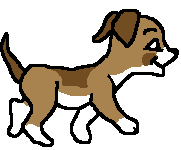Steps to prevent puppy Separation Anxiety
- Faith
- Apr 25, 2020
- 3 min read
Updated: Feb 8, 2023
Separation anxiety can be very common in puppies and young dogs. Dogs are sociable animals that love to be with their human owners as much as possible, but if we don't provide short daily alone times, they can very easily become anxious in their own company.

And as tempting as it is to spend all our time with them, bear in mind that you don’t want your puppy to struggle when you have no choice but to leave them alone, so the best thing you can do is to address any potential anxieties before they start.
Anxious behaviour in your puppy can include excessively following you around from room to room (including the loo!), chewing things like furniture, shoes or anything that takes their fancy! Other signs could be barking, whining or toileting indoors.
By putting some small rules in place each day will be of great benefit to help them feel relaxed and calm anytime you leave the room or have to go out.
Here are some simple steps to help prevent Separation Anxiety:
· Be a leader to your puppy, dogs rely on their owners for direction otherwise chaos can ensue and with your guidance to learn the rules, will better understand what is expected of them.
· Structure their day and create a daily fun schedule of feeding, walking, playing, training, cuddles and ‘just puppy’ times. And obviously these should fit in with your lifestyle. This gives puppies stuff to expect and look forward to. Being consistent with your young dog will reap great rewards later on.
· Begin the ‘just puppy’ times in stages, start once or twice a day and it might be simply a few minutes each time whilst you are in another room or popping outdoors, then your puppy learns that you will always be coming back. Gradually increase the amount of time your puppy spends on their own.
· Crates are fantastic for puppies as they create a ‘den-like’ space to help them feel safe and comfortable. Or you could use a stair gate or puppy pen in the room where their bed is housed. Although it may be great that your puppy is happy to sleep overnight in their crate or bed, regular spells of ‘just puppy’ time during the day are the best way to alleviate any potential separation anxiety in the future.
· Keep your comings and goings low key and avoid eye contact for a few seconds every time, as dogs rely on our body language for information from us. If your puppy learns that when you leave it is no big deal, they will accept the situation much more quickly.
· You could video your puppy when you are away from them to see how they react. If you notice anxious signs, go back a step and next time leave your puppy for a bit shorter time and increase again slowly.
· Give your puppy a special treat when they are left alone. A long-lasting food source like a Kong can be a good idea so they associate being alone with something nice.
· ‘Just puppy’ times should be when they would naturally feel a bit tired, like after a walk or play session. This will provide a better opportunity for relaxation.
Remember these steps are just for early learning, once your puppy or young dog has learned to relax when alone, you will notice they will naturally take ‘just puppy’ times and happily relax at any time during the day.
Although prevention in young puppies is the best process, if separation anxiety has become an established issue in your dog, then a behaviourist may be required to help.
Call Faith on 07941 640348 for a friendly chat
#separationanxiety #puppyseparationanxiety #dogseparationanxiety #puppytraining #121puppytraining #dogbehaviour #dogbehaviouriststevenage #hertfordshiredogtraining #puppytrainingstevenage #121behaviourtraining #121puppytrainingstevenage





Comments